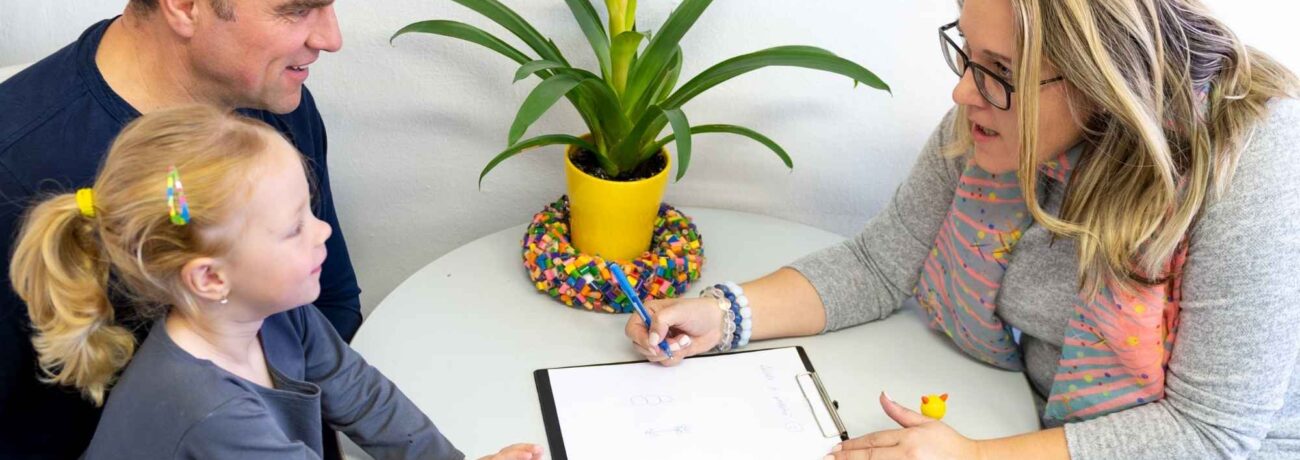When preparing for an autism evaluation, many families wonder what questions they will be asked. Autism assessment questions are designed to uncover details about developmental history, social communication, body language, daily routines, and behaviors that may signal autism spectrum disorder (ASD). For adults, the questions often focus on social situations, facial expressions, and lifelong patterns of communication style and sensory sensitivities. For children, parents provide information about developmental milestones, repetitive behaviors, and traits that may affect learning or social interaction, including results from an autism test.
Understanding these questions helps families prepare for what can feel like an unfamiliar process. With the right information, parents and adults can approach evaluations with confidence, knowing what evaluators are looking for, how answers will guide next steps, and the importance of reaching an autism diagnosis.
At Champions ABA, we provide Diagnostic Evaluation Services across Connecticut, Massachusetts, and Colorado. Our evaluations combine standardized diagnostic tools, professional expertise, and compassionate care to provide clarity and an individualized plan. If you’re ready to move forward, schedule a diagnostic evaluation with Champions ABA today and take the first step toward answers and support.
What Are Autism Assessment Questions?
Autism assessment questions are structured queries asked by qualified professionals such as psychologists, developmental pediatricians, or occupational and speech therapists. These questions are designed to assess communication ability, social interaction, repetitive behaviours, and sensory experiences to determine if an individual meets the diagnostic criteria outlined in the Diagnostic and Statistical Manual of Mental Disorders (DSM-5).
While some people may be familiar with online screening tools like the Autism Spectrum Quotient (AQ) or the Modified Checklist for Autism in Toddlers (M-CHAT), these are not substitutes for a formal diagnosis. True diagnostic assessments incorporate multiple sources of information, including interviews, direct observation, standardized diagnostic instruments like the Autism Diagnostic Observation Schedule (ADOS-2) and the Childhood Autism Rating Scale (CARS), as well as other tests.
In Connecticut, Massachusetts, and Colorado, Champions ABA offers comprehensive evaluations that use assessment questions to identify autism spectrum disorder and guide families toward effective therapy and support services.
Common Autism Assessment Questions for Children
Childhood assessments rely heavily on input from parents and caregivers, since children may not be able to answer questions directly. Parents are asked to reflect on their child’s development, social communication, and daily behavior. Evaluators compare these answers with direct observations and standardized diagnostic tools, along with specific tools that assess various aspects of development, to form a clear picture.
Developmental History
- When did your child reach early milestones such as walking, talking, or forming sentences?
- Has your child ever lost previously acquired skills in language or play?
- Are there delays in speech, cognitive development, or motor coordination compared to other children?
Behavior and Social Interaction
- Does your child make eye contact, use facial expressions, or respond to body language?
- How does your child behave in group settings like school or playdates?
- Does your child show interest in friendships, or do they prefer solitary activities?
Repetitive Behaviors and Daily Routine
- Does your child repeat words, rock back and forth, or engage in other repetitive behaviors?
- Do they have strong preferences for routines and struggle with minor changes?
- Are there sensory sensitivities, such as difficulty with loud sounds or certain textures?
At Champions ABA, our evaluators help parents feel comfortable discussing sensitive details. The answers provide essential insight into how autism may affect a child’s daily life, and they help shape an evaluation that leads directly to a plan for early intervention services.
Common Autism Assessment Questions for Adults
Adults undergoing an autism assessment are often asked about social, occupational, and personal experiences throughout their lives. These self-reflection questions help professionals identify traits consistent with autism spectrum disorder that may not have been recognized in childhood.
Examples include:
- Do you find social situations, small talk, or group conversations stressful or confusing?
- Have you always preferred predictable routines over unexpected changes?
- Do you notice challenges with interpreting facial expressions, body language, or tone of voice?
- Have sensory sensitivities, such as bright lights or strong sounds, affected your ability to focus?
- Have you experienced anxiety or depression connected to social difficulties?
Comparison of Child vs. Adult Assessment Questions
| Child Assessments (Parent-Reported) | Adult Assessments (Self-Reported) |
|---|---|
| Developmental milestones in speech and behavior | Lifelong social communication challenges |
| Play behavior and peer interaction | Difficulties maintaining relationships |
| Repetitive behaviours and restricted interests | Preference for routine and structure |
| Sensory sensitivities in daily routine | Sensory overload in work or public settings |
By distinguishing between childhood and adult-focused autism assessment questions, Champions ABA provides clarity for both parents seeking support for their child and adults pursuing a late formal diagnosis.
How Autism Assessment Questions Are Used in Diagnosis
Autism assessment questions are not stand-alone diagnostic tools. Instead, they are part of a broader evaluation process that includes observation, diagnostic instruments, and developmental history.
For children, evaluators often combine parent-reported answers with tools like the ADOS-2 to observe a child’s social interaction, communication ability, and repetitive behaviors in real-time. For adults, self-reported answers are compared with lifelong behavioral traits, cognitive patterns, and mental health history. This thorough process helps professionals avoid misdiagnosis, including cases where symptoms may overlap with an intellectual disability, and provides an accurate evaluation.
At Champions ABA, assessment questions are used to design personalized care plans. Answers guide recommendations for ABA therapy, parent training, and other supports that address each child’s or adult’s needs. Schedule your diagnostic evaluation with Champions ABA today to begin this process with expert guidance.
Preparing for Autism Assessment Questions
Parents and adults can prepare for evaluations by gathering information ahead of time. Preparation ensures evaluators have accurate context and reduces anxiety about what to expect.
Bring or prepare:
- Medical history, including past evaluations or diagnoses
- Teacher reports, Individualized Education Programs (IEPs), or school feedback
- Notes on behaviors, sensory experiences, and daily routine
- Family history of developmental or mental disorders
- Examples of challenges with communication, facial expressions, or repetitive behaviours
Preparation helps evaluators form an informed perspective and provides families with confidence during the evaluation. Champions ABA provides families with clear guidance on what to bring so evaluations are smooth and effective.
What Happens After the Autism Assessment Questions?
After answering assessment questions, families or adults receive a written report. This report explains whether the individual meets diagnostic criteria for autism spectrum disorder, outlines strengths and challenges, and recommends supports.
Recommended services may include:
- Applied Behavior Analysis (ABA) therapy for communication and social skills
- Parent and caregiver training to support children at home
- Speech and occupational therapy for language or motor challenges
- School collaboration to create or update education plans
At Champions ABA, we ensure that results transition immediately into action. Families in Connecticut, Massachusetts, and Colorado can move from evaluation into tailored therapy services without unnecessary delays.
Why Choose Champions ABA for Diagnostic Evaluations
Champions ABA stands apart by offering evaluations that are individualized, comprehensive, and solution-focused. Our approach goes beyond simple screening questionnaires to provide accurate diagnoses and direct connections to evidence-based therapy.
Families across Connecticut, Massachusetts, and Colorado trust our team of psychologists, BCBAs, and healthcare professionals for their expertise and compassionate care. By combining formal diagnostic tools with autism assessment questions, we give families clarity and a personalized plan for success, ensuring that the needs of autistic people are met effectively.
Conclusion
Autism assessment questions play a critical role in the diagnostic process. They give professionals insight into developmental history, social communication, repetitive behaviours, and sensory sensitivities. For parents, these questions provide an opportunity to share their child’s unique strengths and challenges. For adults, they allow self-reflection on lifelong traits.
At Champions ABA, our diagnostic evaluations use structured autism assessment questions to uncover your child’s strengths, challenges, and support needs. With a team of qualified professionals and a compassionate, family-centered approach, we help children in Connecticut, Massachusetts, and Colorado access the right services from the start. Contact Champions ABA today to schedule your child’s evaluation and take the first step toward clarity and meaningful progress.
FAQs
What questions are asked in an autism assessment?
Questions cover developmental history, social interaction, repetitive behaviours, and sensory sensitivities. For children, parents answer on behalf of their child. For adults, questions focus on communication style, social experiences, and daily routines.
What is the 20-question test for autism?
The 20-question test often refers to screening tools such as the Autism Spectrum Quotient (AQ) or M-CHAT. These are brief questionnaires that can indicate whether further evaluation is needed, but cannot provide a formal diagnosis.
How to diagnose autism in children?
Children are diagnosed through a comprehensive evaluation that includes parent interviews, autism assessment questions, school reports, and direct observation with tools such as the ADOS-2. Champions ABA provides these evaluations in Connecticut, Massachusetts, and Colorado.
How is mild autism diagnosed?
Mild autism, sometimes referred to as Level 1 ASD or Asperger’s syndrome, is diagnosed when a person meets DSM-5 criteria for autism but requires minimal support. Professionals use standardized diagnostic tools, interviews, and detailed developmental history to identify symptoms that may be subtle but significant.


